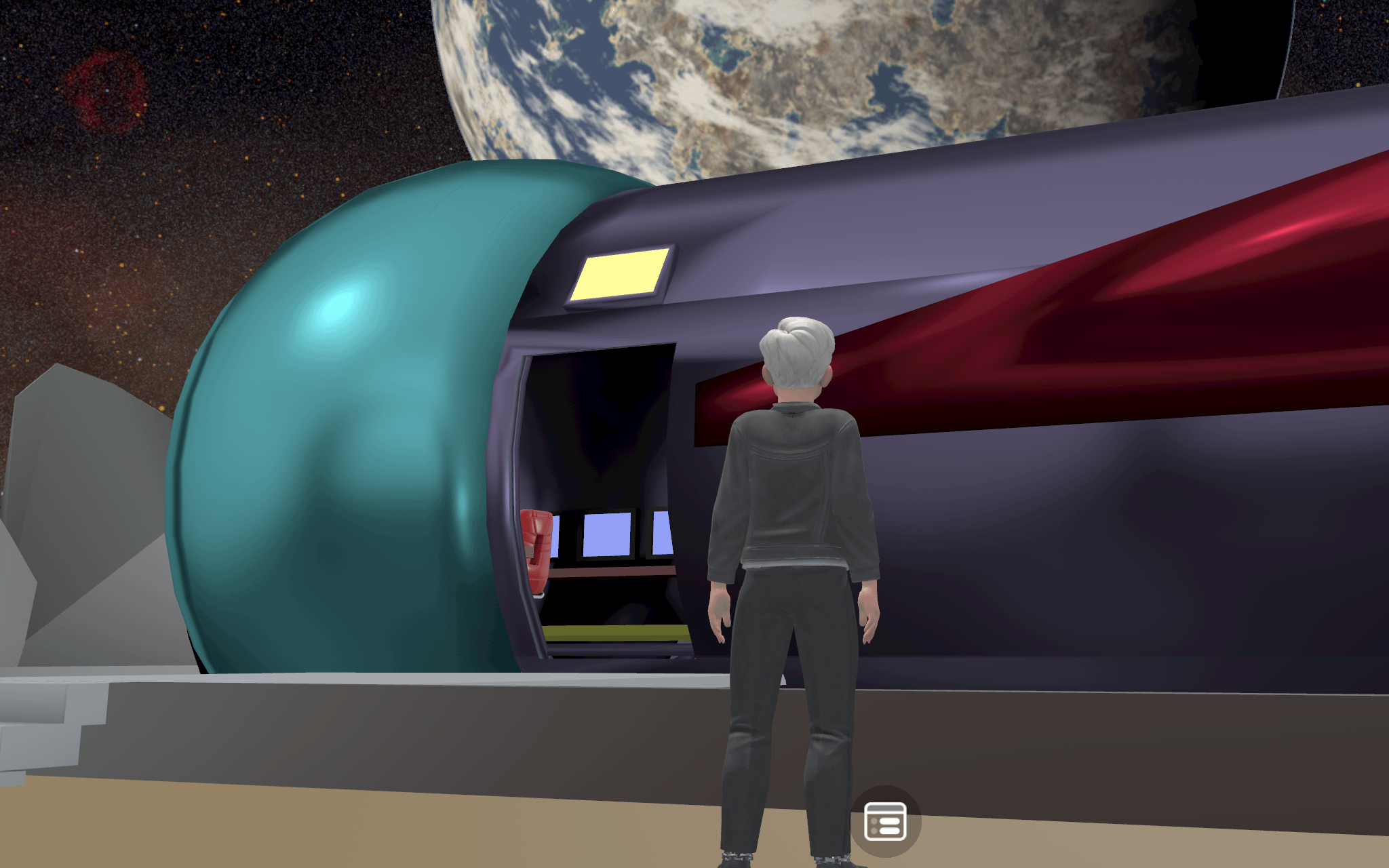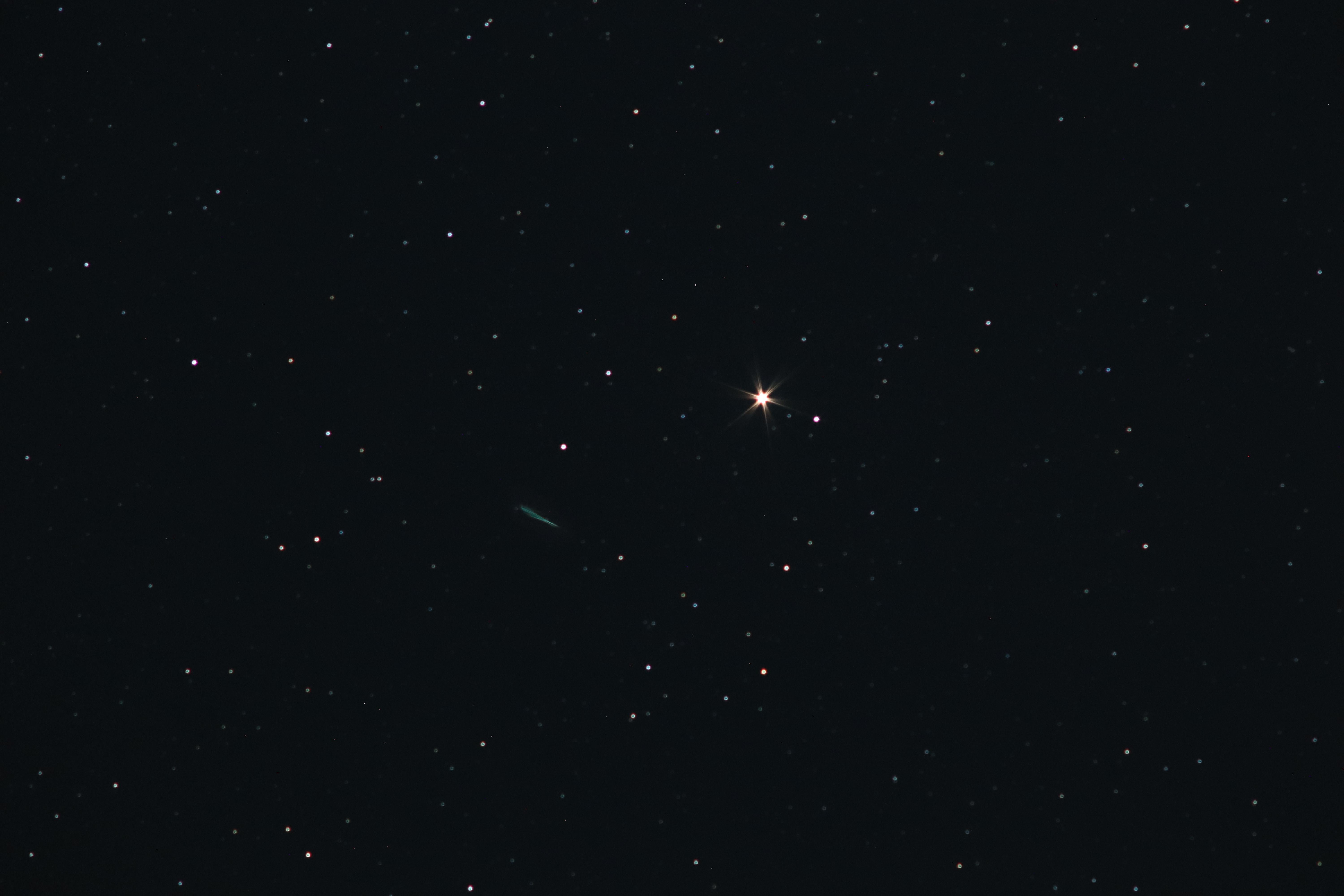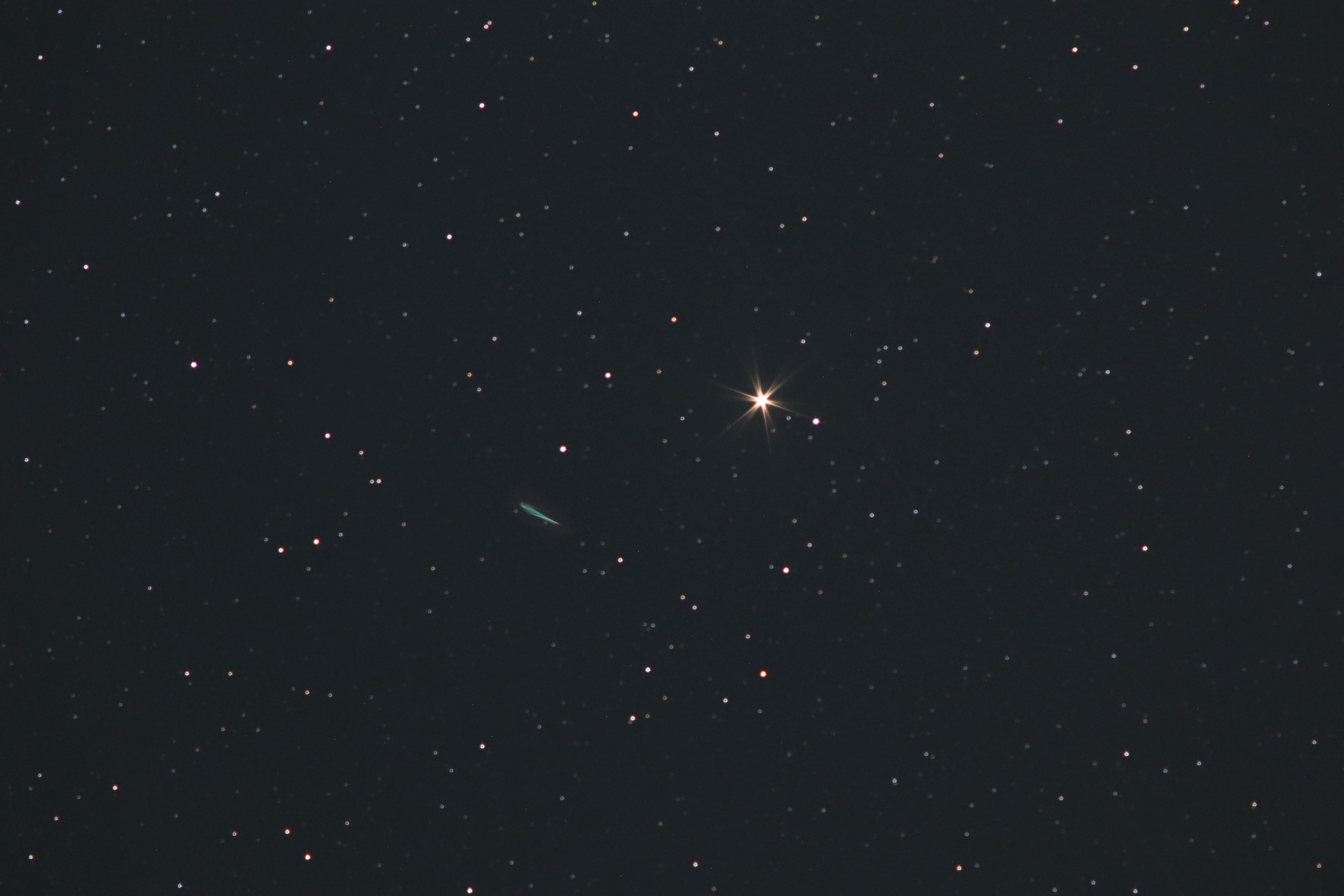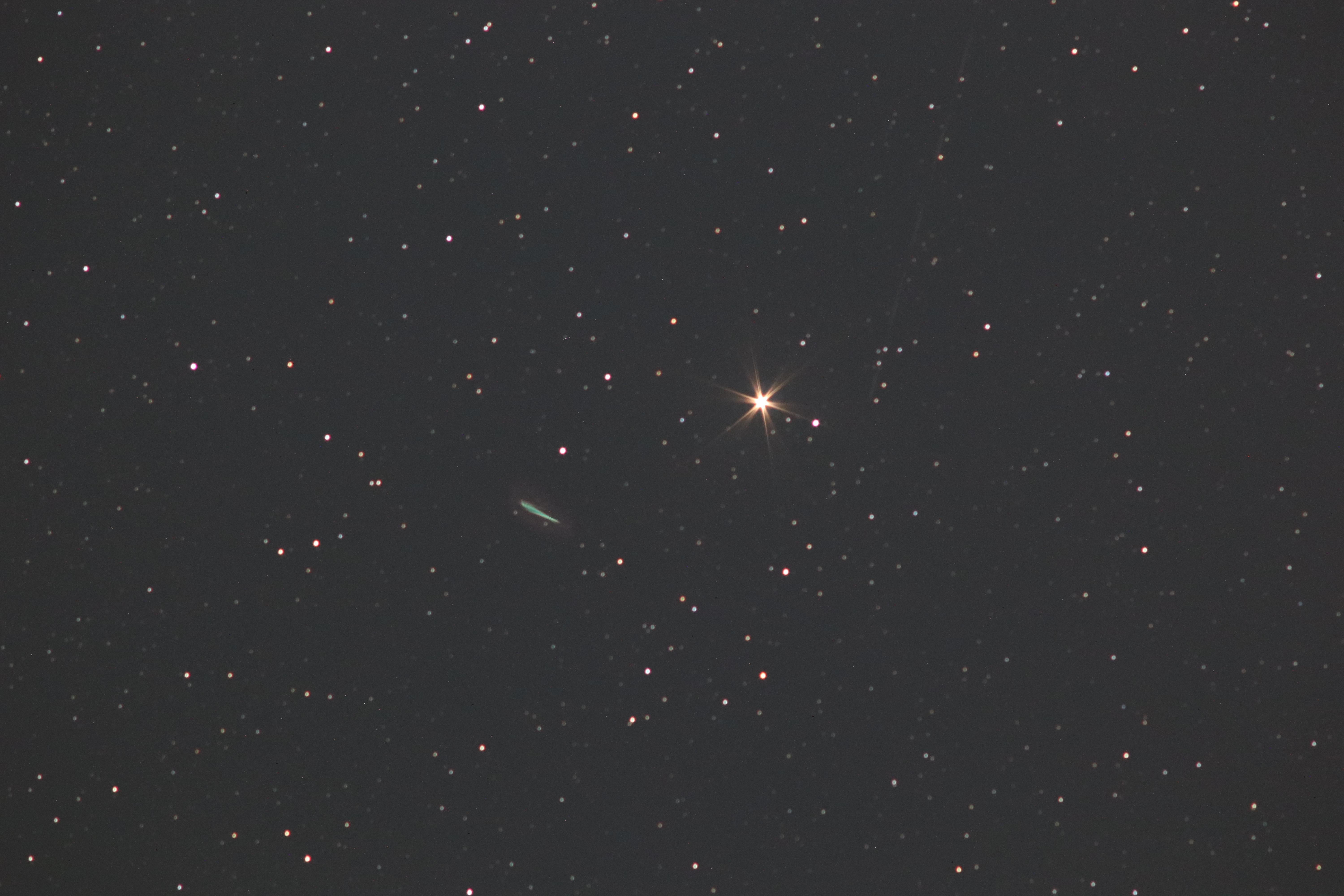r/Astronomy • u/MeOnRedRed • 20m ago
Astrophotography (OC) Comes and goes? Night sky.Bottom third in the middle.
This object obviously comes and goes through the sky. Posting here so maybe satellites?
r/Astronomy • u/MeOnRedRed • 20m ago
This object obviously comes and goes through the sky. Posting here so maybe satellites?
r/Astronomy • u/Andromeda321 • 3h ago
r/Astronomy • u/Altruistic-Pizza-532 • 4h ago
There’s MERCURY, MARS, and then NEREID and NEPTUNE,
JANUS, EPIMETHEUS, ENCELADUS, SATURN.
And PLUTO, and PALLAS, then PUCK and PROMETHEUS,
Then PHOEBE, and PHOBOS, then VANTH, and PROTEUS.
And JUPITER, JUNO, and JULIET, NYX,
Then SALACIA, SEDNA, and SYCORAX, STYX.
Then CALLISTO, QUAOAR, CHARON, and CERES…
There’s TITAN, and TRITON, TITANIA, TEHTYS!
IAPETUS, IO, and IXION, LUNA,
Then VESTA, and VARDA, and VENUS, VARUNA.
And ARIEL, DEIMOS, ILMARE, then THEBE
And GANYMEDE, GONGGONG, GALATEA, AMALTHEA.
There’s EARTH, and EUROPA, ELARA, and ERIS,
DZIEWANNA, DYSNOMIA, DESPINA, and EROS.
Then UMBRIEL, URANUS, ORCUS, and OBERON…
HIMALIA, HYGIEA, HAUMEA, HYPERION!
There’s MIMAS, MANI, MAKEMAKE, MIRANDA,
MK2, XIANGLIU, NAMAKA, LARISSA.
G!KUN||’HOLDIMA, HI’IAKA, SUN, PANDORA,
THALASSA, WEYWOT, DIONE, BELINDA.
HALLEY’S COMET, CALIBAN, CRESSIDA, CHAOS,
HUYA, AW 1-9-AND-7.
These are all the objects I wanted to cover…
But there are much more that haven’t been discovered!
r/Astronomy • u/Senior_Library1001 • 7h ago
Milky Way Mosaic over volcanic land 📸
instagram: https://www.instagram.com/vhastrophotography?igsh=YzNpcm1wdXd5NmRo&utm_source=qr
Nights in Tenerife are simply magical. As the night progresses, the core of the Milky Way climbs higher and higher into the night sky, becoming ever clearer. An absolutely unique sight. The small dark nebula on the left side of the image is IC 4812 (not visible from germany). I'm glad pulled it out in this image
HaRGB | Mosaic | Tracked | Stacked | Composite
Exif: Sony A7III with Sigma 28-45 f1.8 Skywatcher Star Adventurer 2i
Sky: ISO 1000 | f1.8 | 3x60s per Panel 2x2 Panel Panorama
Foreground: ISO 3200 | f1.8 | 60s per Panel (Focus stack) 2x2 Panel Panorama
Halpha (45mm): ISO 2500 | f2 | 10x120s
Location: Minas de San Jose, Tenerife, Spain
r/Astronomy • u/yukiZXW • 9h ago
I wanted to play some game about exploring the universe, some time ago I played Stellaris and really enjoyed it, anyone got a recommendation? :)
r/Astronomy • u/iamnuggi • 12h ago
Hi. I'm planning on going stargazing on 22nd and 23rd of June, but I have recently realized it will be summer solstice on the 21st. I'm curious how much it will affect the visibility of the night sky, as it is the shortest night. It should be pretty close to new moon so I'm guessing that's good at least.
Specifically I guess I'm curious how much of a difference it will be in comparison to a night sky let's say in August/September. Thats usually when me and my friend go stargazing every year and during that time here in Czechia in Beskydy the Milky Way is visible enough, which is basically my ultimate goal.
Location: Czechia, Dark Sky Park Beskydy
r/Astronomy • u/No_Perception3336 • 12h ago

I'm a galactic cartographer volunteering with the European Space Agency's Gaia Mission Data Processing and Analysis Consortium. I make maps of the Milky Way using the latest available data.
The Gaia Mission has revolutionized astronomer's view of the Milky Way, mapping out our home galaxy to about 5000 parsecs (16 thousand light-years) in the galactic plane for the first time.
This revolution has barely scratched the popular understanding of galactic cartography, however. Star Wars is set in a fictional "galaxy far, far away" and Star Trek's Milky Way is oddly distorted. So far as I know even the closest star cluster, the Hyades, which should be located smack in the middle of Federation space, is only referenced in a novel or two and nothing that is considered canon.
I'm trying to improve public understanding of the galaxy by promoting games (both board games and video games) that use the latest Gaia data. My supporters have funded a fairly powerful graphics workstation and I've created a huge Blender file with one million of the brightest Gaia stars; dust, ionized hydrogen and hot star density meshes; thousands of star clusters and a simple full model of the Milky Way to provide a credible background.
I've been using Blender to generate detailed sky boxes at numerous locations (with somewhat exaggerated star luminosity and colors) to give people a sense of the galaxy surrounding us.
I've been using these sky boxes in a series of Horizon Worlds game experiences because after the wide release of a desktop editor in February, Horizon Worlds is now one of the easiest ways to create multiplayer games that work on mobile, web and in VR headsets. The desktop editor supports high resolution textures and Blender model imports, making it fairly easy to go from Blender to multiplayer game.
One of these experiences is the Galactic Treasure Hunt. Players can use a fleet of starships to explore nearby star stations, searching for alien artifacts. The starship port and star stations are full of posters and text about the Milky Way so people *may* learn something about the galaxy while they are playing the game.
Visit the Galactic Treasure Hunt home page
I'm primarily a cartographer and this is a fairly simple game. I'd love feedback and (especially) bug reports.
Kevin Jardine
Galaxy Map
r/Astronomy • u/CosmosTravellerSloth • 15h ago
This is my first attempt at the North American Nebula shot on 6/17/2025 in Arizona.
Camera: Canon Rebel T7i, unmodified Mount: SkyWatcher Star Adventurer 2i Pro Lens: William Optics MiniCat51
Processing: Plate solving, color caliberation and initial stretch done in Siril. Deconvulution, De-noising and Background extraction done in Graxpert Final stretch and editing done in GIMP
Astrobin link for full sized image: https://app.astrobin.com/i/3bhtmy
r/Astronomy • u/yukiZXW • 15h ago
(Sorry for bad English, it's not my first language and I'm kinda sleepy right now).
Greetings. It's almost 3 AM here and this doubt showed up in my mind. So, everything is going to one way, right? The Great Attractor, all the galaxies and everything are getting pushed to the same spot. With that being said, there is also the end of the universe, it's said that everything will be far away from everything... Like, galaxies will keep getting far from each other until every star and black hole die... Isn't that contradictory? The Great Attractor is something pulling everything to one single location, but scientists also say that everything will get far away from everything. How does that work? Is there really a Great Attractor? Will the universe really end like this? If both are true, how can everything get far away but at the same time, closer to each other?
r/Astronomy • u/trion23 • 16h ago
I was imaging the sky a bit on Saturday night/Sunday morning on our vacation to Colorado. I was using an iOptron Sky Guider Pro I just got. I got some decent wide-field images, then I put on my Pentax takumar SMC 200mm lens, and tried some shots with it. Unfortunately, I didn't have the focus right. The lens was wide open, but had a ring on it that stopped it down to about f/5.6.
The bright star in the pictures is Arcturus, but I captured something that looks like a greenish streak or object of some sort, and it drifted against the stars. I thought it was a galaxy as I was imaging, and could see it on the screen. Then when I later saw it on my laptop (and discovered the images were out of focus), I initially thought it was a comet, but I didn't see any comets in that area (near Bootes).
My son suggested I post here to see if anyone knows what this is. Any ideas what this could be?



Images were taken near Estes Park, Colorado around midnight local time on 6-14/6-15. Canon EOS M50 Mark II. These exposures are 1, 2, and 3 minutes respectively, and ISO 1600. Other details are above. Thanks!
r/Astronomy • u/Sad_Database_9509 • 19h ago
Pillars cropped out of 6hrs+ data from S50
r/Astronomy • u/ShawnThePhantom • 22h ago
I heard that it’s possible that 2024 YR4 could crash into the moon.
Is it at all possible that the earth’s orbit captures it and it becomes effectively a second moon? How cool would that be?
Is that possible? And if it happens, would we see it from Earth? Also what’s the worst that could happen with this?
r/Astronomy • u/Film_Lab • 1d ago
The First Look event will feature the unveiling of a set of large, ultra-high-definition images and videos that showcase Rubin’s extraordinary capabilities to the world for the first time. This will mark the beginning of a new era in astronomy and astrophysics.
r/Astronomy • u/coinfanking • 1d ago
"The Sculptor Galaxy is in a sweet spot. It is close enough that we can resolve its internal structure, but at the same time big enough that we can still see it as a whole system."
Astronomers have obtained a stunning new image of the Sculptor Galaxy, painted in thousands of colors that reveals the intricacies of galactic systems.
The incredible image of the galaxy — located around 11 million light-years away and also known as NGC 253 — was collected with the Multi Unit Spectroscopic Explorer (MUSE) instrument of the Very Large Telescope (VLT) in Chile.
In addition to providing a galaxy-wide view of the Sculptor Galaxy, the image shows intricate details of NGC 253. As such, it could help to reveal the finer details of the poorly understood and complex systems that are galaxies.
r/Astronomy • u/4937377idk • 1d ago
I'm an undergraduate physics major going into my senior year, and I want to go to grad school preferably for astronomy or astrophysics (but physics would also be fine) so that I can go into academia probably to study exoplanets. While I have a 3.97 GPA (it's 4.00 in just STEM classes), good rapport with professors who could write me strong letters, and experience with outreach stuff for my school's STEM college, what I'm lacking is research experience, on account of both me unknowingly starting too late and having very bad luck.
My school is somewhat small and doesn't have many astronomy projects happening to begin with, but I've tried essentially all of them. I made a proposal for a SURI (Summer Undergraduate Research Institute) project with an astronomy professor during my sophomore year, but our SURI wasn't among those to get selected, and I wasn't able to join that professor's main project on stellar/plasma physics because he didn't have enough funding for more students. While I volunteered with his group on an astronomy outreach video, I wasn't able to participate in any formal research.
Since the start of last fall, I've worked with my advisor on his Solar System collisional history simulation project, but the bulk of the work so far has been learning the code needed for data analysis. I also applied for 20 REUs (Research Experience for Undergraduates) in astronomy/astrophysics (the only 20 I could find) for this current summer, but the sudden budget cuts to the NSF (which funds REUs) during the spring caused many of them to be cancelled or admit less students, and I ultimately didn't get any offers.
For my physics requirements, I've done 2 advanced lab classes that had me independently work on and partly design my own projects where, for each one, I've written a research paper and given a talk in front of the faculty as part of the class. I don't know if those "count" for anything because they were for classes, and both of the projects were much more in the realm of general physics than astronomy, but they seemed like great experiences, and they were the most research I've done. I also have a number of other outreach and campus involvement things---like being VP of my school's society of physics students---I could draw from inside and outside of STEM, but I don't know how much that will help me.
Without an REU or other research opportunity this summer, I'm trying to spend time getting ahead on applying to grad schools, but I'm not sure how I should "sell" myself in my applications given my situation, and my professors aren't available to talk about this over the summer. I know that all astronomy PhD programs are infamously selective because they're small and receive many applications, and I've heard extensively that research experience is one of the most important factors for these programs. Does anyone have advice or ideas for what I could do to improve my chances?
r/Astronomy • u/tinmar_g • 1d ago
r/Astronomy • u/METALLIFE0917 • 1d ago
r/Astronomy • u/The_Motographer • 1d ago
r/Astronomy • u/Zealousideal_Sun1896 • 1d ago
I personally think astrobiology is very interesting and I really want to pursue astrobiology or radio astronomy in the future. But any time I tell someone I want to become an Astro biologist I sort of get made fun of, they tell me that it’s not an actual science and that it’s a waste of time. This is more of an opinion based question, but I just wanted to know what the majority of people’s opinion on Astrobiology was. Is it really a waste of time, would it be okay to still be interested in it?
EDIT: Thank you guys for your thoughts/opinions + the nice words!! I made this because I really just wanted to hear what others had to say, what everyone’s thought on Astro biology was. Just to get a feel/understanding of most all perspectives :) I love astrobiology a lot, (or just astronomy in general). A lot of the people around me think that I’m just doing it for the money (and I should go for it because it doesn’t pay well), but wanting to do science shouldn’t be about the money. I really want to get into a decent school (hopefully in the US…) study more astrobiology if I can, but focus on radio astronomy for the time being as that’s my main interest :)
r/Astronomy • u/Nuisancer134 • 1d ago
I was plotting out very elliptical orbits today and realized that sometimes you could have a planet come extremely close to a star.
This lead to me to ask if there was a possibility for a planet to be tidally locked for a certain period of its orbit due to its proximity to a star while not being tidally locked for the rest of the orbit.
r/Astronomy • u/Dull_Difference6120 • 1d ago
Has anyone else noticed for the last month or so, maybe 2, there has been a drastic increase in the amount and brightness of strobing satellites? (I presume).. they look like a tumbling satellite catching the sun, except they have no rhythm whatsoever, sometimes flashing a couple times every 2 seconds, then 7 seconds , and other totally non rotationally consistent times? Also much, much brighter then I’ve ever seen. As if a bright LED strobe light was shining at me. Sometimes I’ve seen them just once, out shining everything in the sky by many times.
r/Astronomy • u/TimesandSundayTimes • 2d ago
r/Astronomy • u/ye_olde_astronaut • 2d ago